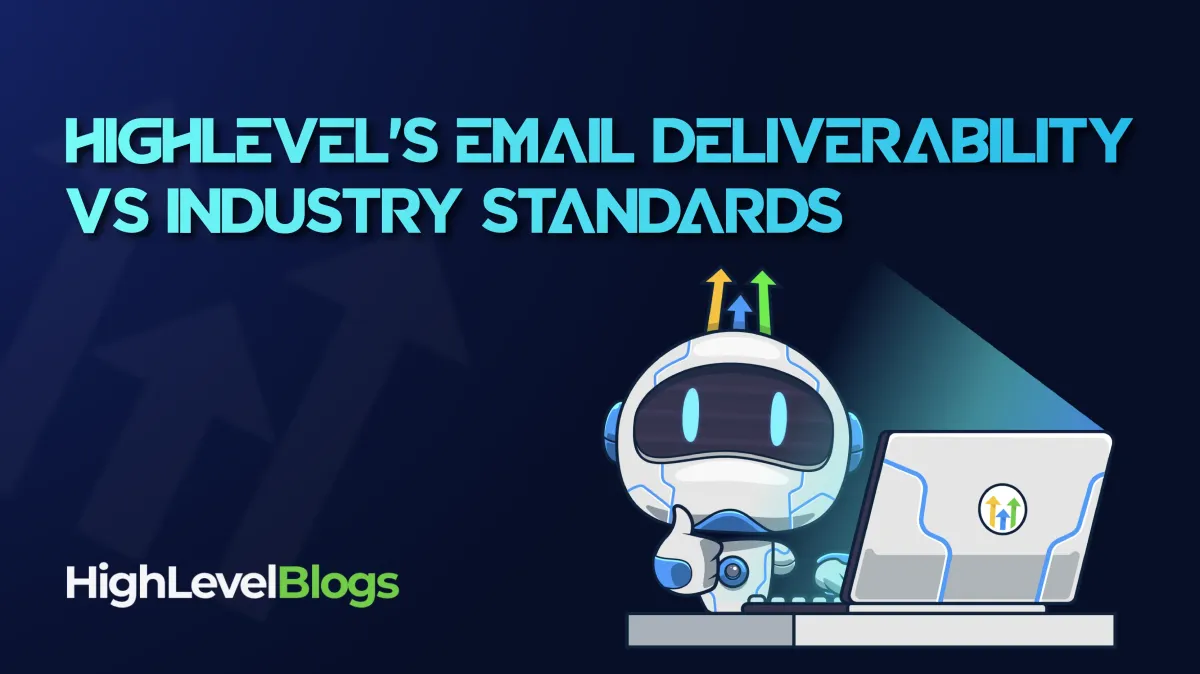
HighLevel's Email Deliverability vs. Industry Standards
You’ve spent hours crafting the perfect email campaign. Your subject lines are engaging, your content is well-written, and your offer is compelling. You hit send and wait for the results… only to find low open rates, minimal clicks, and disappointing engagement.
This is more than just bad luck. It’s an email deliverability problem.
Most businesses assume that when they send an email, it arrives in the recipient's inbox. In reality, a significant percentage of emails never make it past spam filters, get flagged as promotional, or simply go missing.
The industry-standard email deliverability rate is 96.43%, meaning almost 4% of emails never reach their destination. That might not seem like a big deal, but if you're sending 100,000 emails per month, that's 3,570 lost opportunities.
HighLevel, on the other hand, delivers emails at an impressive 97.4% rate—outperforming industry standards and ensuring that more of your emails actually get seen.
But deliverability is only part of the equation.
Once an email reaches the inbox, will it be opened? Will the recipient engage?
Here’s how HighLevel stacks up:

With higher deliverability, open rates, and click-through rates than the industry average, HighLevel isn’t just another email marketing tool—it’s an email engagement powerhouse.
In this article, we’ll break down:
What email deliverability really means and why it’s crucial.
How HighLevel’s infrastructure helps businesses outperform industry averages.
The key differences between HighLevel and platforms like Mailchimp.
How businesses can optimize their own deliverability using HighLevel.
Let’s get into it.
What Is Email Deliverability and Why Does It Matter?
Email deliverability is a measure of how many of your emails actually land in a recipient's inbox rather than the spam folder.
A high deliverability rate is crucial because:
Inbox placement matters – If an email goes to spam, it’s essentially invisible.
More opens = more engagement – If an email is never seen, it can’t be opened.
A strong sender reputation helps future emails – Poor deliverability can damage your domain reputation, making it harder for your emails to be delivered in the future.
How Is Email Deliverability Determined?
Email providers like Gmail, Outlook, and Yahoo analyze various factors before deciding where to place your email. They ask three key questions:
Is the message safe? (Does it pass authentication checks?)
Is the message wanted by most recipients? (Do users engage with emails from this sender?)
Is the message wanted by this particular recipient? (Has this user engaged with emails from this sender before?)
If the answer to all three is yes, your email lands in the inbox. If any of them are no, it’s more likely to end up in spam.
Sender Reputation: The Key to Better Deliverability
Every sending domain has a sender reputation score assigned by mailbox providers. Think of it as a credit score for email marketing.
Unfortunately, there’s no single source where you can check your reputation—each email provider uses its own algorithm. However, the most critical factor in determining sender reputation is subscriber engagement.
How Subscriber Engagement Affects Deliverability
Mailbox providers look at how recipients interact with your emails:
Positive Engagement Signals (Boosts Reputation)
Opening your emails
Clicking on links
Replying to emails
Moving emails from spam to inbox
Negative Engagement Signals (Hurts Reputation)
Ignoring emails (low open rates)
Marking emails as spam
Deleting emails without reading
Unsubscribing frequently
The more positive signals you generate, the higher your sender reputation—which leads to better inbox placement.
Best Practices to Improve Email Deliverability on HighLevel
Even though HighLevel provides above-average deliverability, you still need to follow email best practices to maintain strong inbox placement.
1. Maintain a Healthy Email List
Only send emails to subscribers who have explicitly opted in.
Use double opt-in or CAPTCHA to prevent spam sign-ups.
Regularly clean your list by removing cold subscribers (people who haven’t engaged in a while).
2. Be Consistent with Sending Behavior
Mailbox providers prefer predictable sending behavior. Avoid sudden spikes or inactivity.
Keep your sending domain consistent – Don’t switch between multiple domains frequently.
Maintain a steady sending volume – Don’t suddenly email 20,000 new subscribers overnight.
Email at least once per month – If you go inactive, email providers won’t have enough data to trust you.
3. Optimize Your Content for Better Engagement
Even though sender reputation matters more than content, your email design and messaging still play a role.
Avoid spammy language – Words like “FREE!!!” or “URGENT” can trigger spam filters.
Don’t use link shorteners – They’re often associated with scams and flagged as spam.
Balance text and images – Emails should still make sense if images are blocked.
4. Encourage Engagement from Subscribers
The more subscribers engage with your emails, the higher your sender reputation.
Ask a question and encourage replies.
Include a clear CTA (call-to-action) to boost clicks.
Allow subscribers to set their email frequency preferences to reduce unsubscribes.
HighLevel vs. Mailchimp: Which Platform Delivers Better Results?
Many businesses default to Mailchimp for email marketing, but does it really offer the best deliverability?
How HighLevel Outperforms Mailchimp

Mailchimp users often struggle with inbox placement due to shared sending reputation and limited authentication tools.
With better sender authentication, smarter list management, and engagement tracking, HighLevel ensures higher inbox placement and better open rates.
Final Verdict: Is HighLevel the Best Choice for Reliable Email Delivery?
If email marketing is a key part of your strategy, deliverability should be your top priority.
HighLevel isn’t just another email tool—it’s a full-fledged email engagement platform that ensures your messages actually reach your audience.
With industry-leading deliverability rates, higher open rates, and built-in optimization tools, HighLevel is one of the best email marketing tools for 2025.
The Best Way to See the Difference? Try It Yourself.
Take HighLevel for a spin with a FREE 14-day trial and see how much stronger your email marketing can be.

